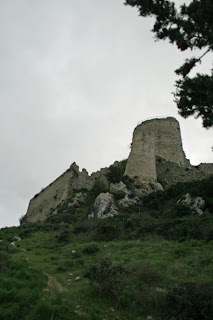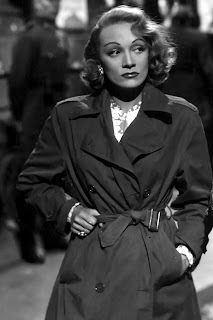Helena P. Schrader's Blog
September 8, 2025
The Historic Traveler -- A Community for Lovers of Historical Fiction
Settings inspire and inform readers no less than novelists. Historical sites are thus an ideal venue for connecting books to readers. On the one hand, many readers will consciously seek out the venue of a favorite book. On the other hand, many travelers look for books about the places they are seeing. That's the idea behind "The Historic Traveler." The founder, Jackie Lapin, explains in a short interview.

Jackie, how do you see therelationship between settings and historical fiction? Are the settings of booksimportant to you?
Certainly, the settings are vital to thehistorical context of a place. Reading a novel that is place-based not onlybrings the novel to life but creates a yearning to see the real thing. I findthat historic fiction not only whets my appetite to see a location, but alsoprovides the context for what I am seeing when I get there. I understand whathas transpired here, if, of course, it is rooted in some historic truth. I’mexcited to see Marie-Antoinette’s bedroom or the Hall of Mirrors at Versaillesbecause I try to imagine what it would have been like to have been here at thattime. The novel has given me some tasteof what whispered conversations might have happened here. I recently paid avisit to The Château de Chenonceau in the Loire Valley, having read severalnovels and history books on Catherine de Medici –I was fascinated at being inher bedroom in the chateau that she confiscated from her husbands’ mistressupon his death. Knowing the reality, reading the fiction, and seeing the actualroom, I find thrilling.
Do you enjoy readingdescriptions of places in books? Or do you prefer to discover settings yourselfby traveling?
A little of both, I think. I do enjoy thedescriptions, and it helps me know what I want to see should I visit a city,palace, church, fortress, ruins or other. But obviously, there are many placesI discover in travel that I’ve not had a chance to read about prior to going.Now when I read about that site afterward, I can visualize it with clarity. Itmakes reading more enjoyable when I’ve seen the real thing!
Do you enjoy readingabout exotic places -- or do you prefer reading about places you know?
I like to read and see exotic locations,but that for me is adding spice to a diet of wonderful experiences. It fills inthe fringes of my knowledge about the world. I just bought a book based ancientBabylon and Assyria precisely because I don’t know much about that part of theancient world and what remains historically. I’ll read novels about ancientChina, Japan or other Asian localities. But the core of my interest is UK,Europe all the way East, around the Mediterranean and North America. I willthrow in a good book from Australia, New Zealand, the Caribbean or Polynesia aswell. But I find it’s wonderfully fun to read a book set somewhere that I havebeen because it ignites the memory and meshes it with the imagination.
Do you find yourself visiting places because of a book -- or reading a book because you've visited a historical venue?
On some occasions, the former. Having beena fan of books on Mary Queen of Scots, Holyrood Palace was a must, and to standin the very room where the great drama of the murder of her secretary occurredwas memorable. But what is more likely is that I have scheduled a tripsomewhere and then will start reading a steady diet of novels set in thatlocality. That gives me the history in a wholly digestible way. While I alsolove history books, it’s the novels that make history way more fun to read. Bythe time I hit the ground, it’s likely I’ve a pretty good idea of the peopleand the circumstances which defined this site, as so many novels are builtaround figures who actually lived—either as the protagonist or as an associatedcharacter. Even if the protagonist is fictional, should he or she be at thecourt of a King or Queen, the lead character will be impacted by the realhistorical events, and you can gain context.
Can you share one ormore examples of places you've visited because of a novel you read?
Probably the one that is more directlyrelated to booking a trip wasn’t an historical novel, but was rife withhistorical localities—and that was Dan Brown’s Inferno. Florence wasalways on my list, but after reading about the various landmarks, churches,palaces, museums, gardens, the Ponte Vecchio, the Vasari Corridor, etc, wherethe non-stop chase takes place, I was smitten. And before long, I was on my wayto see it for myself!
I’ve read so many Henry VIII novels, amajor goal was to see Hampton Court Palace, both Henry’s favorite and now mine!I love it for the history that transpired here, but also for its uniquequalities—the first palace with an indoor tennis court, the first with brickchimneys—all differently designed. Having read so much on this period, it was ajoy to actually walk its halls where Henry decided the fate of so many,including Cromwell (Hillary Mantel’s Wolf Hall)
I will say that many of James Michener’snovels helped inspire me to visit various localities such as Israel, Spain,Hawaii, Mexico and Colorado to absorb the history he depicted.
What about the reverse, can you namesome books that you have read because of places you've visited?
Yes, actually! One of my favorites was aseries I picked up in Australia called Kings in Grass Castles and Sonsin the Saddle that brought to life the building of the great outbackstations. Having been to the fascinating historic core of Rome, I’m a suckerfor a good Roman series like Kate Quinn’s Empress of the Seven Hills.I’m drawn to books about amazing women in history and three come to mind—PersonalLibrarian about Belle da Costa Green, who was the acquisition specialistfor the JP Morgan Library and Museum in NewYork City, The Engineer’s Wife (Emily Warren, wife of Wash Roebling, whotook over from her husband as Chief Engineer of the Brooklyn Bridge) and TheCape Doctor (based on Cape Town's renowned Dr. James Barry, born in 1795 asMargaret Anne Bulkley, who lived life as a man so she could practice themedicine that was prohibited to women.) All of these I was especially drawn tobecause I had been to or seen all of these locations.
Tell us more about the"Historic Traveler" community?
The Historic Traveler is a unique blog for history lovers that combines stunning photosand lively descriptions of historic locations around the world, coupled withrecommendations for historic novels, mysteries, histories and biographies thatilluminate what it would have been like to live there. I created it out of mylove for history, historic novels and the passion to share the photos from themore than 500 localities that I have visited and photographed.
I also created Historic TravelerInternational, the membership community that goes deeper! It gives accessto the 80-page quarterly digital Historic Traveler Magazine(divided between destinations in front and media in the back—books, TV,movies); the world’s mostcomprehensive directory of historic novels, mysteries and history books bycountry or region; the world’s first comprehensive directory ofhistoric hotels, inns and B&Bs; a directory of historic TV dramas onbroadcast or streaming; exclusive travel discounts and travel booking agent; abook club dedicated to history buffs; a book swap; a monthly community meeting andchat room with other historic travel enthusiasts; a matching resource forpeople who are looking for traveling companions; interviews with leadingexperts and authors; specialty books of themed photo collections, and ongoingnews about travel opportunities to historic places. You can go to to www.TheHistoricTraveler.com toexplore or sign up for the historic location features, book recommendations andmore.
What made you launchthis project?
I am at a point in life where I wanted todo something that brought all of my passions together—my vast reading ofhistoric novels, my knowledge of historic locales, my archive of 40,000 images,my love of storytelling (I’ve written professionally throughout my career) andmy mission to serve and share. But Ialso like the idea of finding other history, historic novel and travel buffs,so I wasn’t operating in isolation. We all know today that people craveconnection and community and I wanted to create something that delighted andfulfilled people by bringing them together in these shared passions!
8. Where and how can we take part?
Here’s a free gift for you and yourreaders, our eGuide 20 Great International CitiesWhere You Can Immerse Yourself in History …and the Books That Make You Feel asif You Lived It! Youcan get it at www.thehistorictraveler.com/guide
And then come on over to check out theblog, sign up for the updates, and join one of our general meetings or bookclub meetings to get acquainted. Feel free to reach out on socialmedia—Facebook Instagram, Pinterest, TikTok, YouTube or LinkedIn. I lookforward to continuing the dialogue with folks over there!
September 1, 2025
Celebrating and Moving On!
I am pleased to announce that the 2025 Awards Season has gotten off to a great start.
Both Cold Victory and The Tale of the English Templar were honored.
Cold Victory took GOLD in the Category Political Thrillers
The Tale of the English Templar took BRONZE in the Category Historical Fiction.
 Henceforth, I will be making weekly posts on my Substack page. You can find me at:
Henceforth, I will be making weekly posts on my Substack page. You can find me at: https://hpschrader.substack.com
Hope you'll join me there!
August 25, 2025
Settings that Inform
The encounter with Sparta that changed everything.
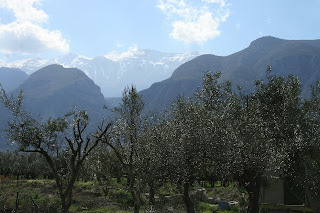
Even someone who has never studiedSparta or read a single book about it has images of Ancient Sparta transmittedthrough our language alone. “Spartan” isan adjective used to denote “severe,” “plain,” and “austere.” Laconic speech is“terse,” “concise” and “economical.” The most rudimentary and fleeting brushwith Sparta inliterature almost invariably includes reference to rigid discipline, disdain forluxury, self-sacrifice and endurance of hardship.
The more one looks into Spartan society, the quicker he/she isconfronted by references to a childhood of deprivation in which one had tosteal to get enough to eat and was allowed only one garment per year. The boys,we learn, had to cut down the river reeds with their bare hands or the help ofa tool which is dismissed as practically worthless, and then sleep upon theseinstead of real beds. Worse, they had to live practically in the wild, exposedto the elements without shelter or proper clothes. Books like Gates of Fire describe horrendous beatings to which Spartan boyswere apparently subjected for any tiny infraction of the rigid rules ofacceptable behavior.
Nor are youths the only Spartans whom, we are led to believe, suffereddeprivation. This was a society, according to most sources, where women wereprohibited from wearing jewelry or even taking pride in their weaving. Indeed,all gold and silver was banned, and so could adorn nothing - not even thetemples of the Gods. The houses, we aretold, were not painted (as else where in the Ancient world), and if onebelieves the oft quoted “sayings of Spartan kings” they did not even hew theirhouse beams into regular square posts, but left them raw and untreated – oneimagines crude timber as in a log cabin. Meanwhile, the young men lived inbarracks (notoriously grim places in any society!) and for their entire livesate their meals at men’s clubs where the cuisine, we soon learn, was infamousthroughout the ancient world for its lack of sophistication and variety.
In short, it sounds like a society barely surviving in a hostileenvironment, a society which had made a virtue out of necessity.
And then I went to Sparta... As I drove down the modern road from Tripoli (or Tegea as I prefer tothink of it) toward Sparti (Sparta) there came a moment when coming around a bend I caught the first glimpse of the Taygetos mountains. The view took my breath away. I could hardly concentrate on the winding roadfor straining to get another glimpse of those spectacular, snow-cappedmountains. When after another twenty minutes of driving the valley of the Eurotas spread out before me, it was a revelation. My image of Sparta – AncientSparta and all that Spartaimplied – was transformed in a single instant.
The valley of the Eurotas is anything but barren! It is quite thereverse. It is green and fertile and stunningly beautiful -- like riches cuppedin the hands of the gods. From the blooming oleander to the wild iris, thevalley is a garden. The orange orchards stretch as far as the eye can see,brazenly advertising not only the abundance of soil and sun but of water as well.Most spectacular of all, the Eurotas valley is one of those few places on earththat offers the sensually stimulating sight of palm trees waving against aback-drop of snow-capped mountains.
I asked myself: has Laconiaperhaps changed dramatically in the last 2,500 years? Was it poor when theharsh, economical, self-disciplined Spartan society took root in its -- then -- sparse and almost barren soil? Does itbloom now artificially because of modern fertilizers and irrigation?
If we are to believe the ancient historians, no. Herodotus speaks of Sparta’s “good soil”. Thucydides describes the entire Peloponnese (with the exception of Arcadia) as the “richest part of Hellas.”It is when speaking of Athens, that Thucydides draws attention to “the poverty of her soil.”
So the fertility and abundance of the valley has not changed sinceAncient times any more than the shape of the mountains that enclose it. But if this rich valleywas the seat of Sparta,then Spartan austerity and deprivation did not come from necessity! If Sparta’s land was rich,fertile and productive, then it could have enabled the highest standard of livingavailable in the ancient world -- at least to the always modest number of eliteSpartiates. In short, if Spartawas as austere a society as it is depicted in modern times, then that austeritywas self-imposed.
Is it reasonable to imagine that a people raised in the midst of wealth and beauty had no appreciation for either? Or is the very austerity of Spartan society as mythical as the thin soil described in modern novels about Sparta? I started to wonder if our images of a rigid, harsh and brutally disciplined society were a distortion or exageration? A fractured image? A misunderstanding based on ignorant,or prejudiced foreign reporting? Imagine what American society looked liked through the eyes of the Soviets or the Taliban!
That was when I started to seriously research Ancient Sparta, focusing on ancient sources, primary sources, archaeology and and scholarly works. I soon discovered a different world from that of Hollywood, Stephen Pressfield and the global fascist movement that has expropriated so many Spartan symbols. Following extensive research, participation in scholarly fora, and personal contact with some of the leading modern scholars of Ancient Sparta, I have come to believe that popular modern images of Sparta are based largely on inadequate, hostile and sometimes purely fanciful source material. So I set out to describe a different Sparta, a Sparta consistent with the ancient sources, but enhanced by common sense interpolation and an understanding of human nature. On the assumption that exaggerations and myths often have a kernel of truth, I did not turn Sparta into paradise of luxury and self-indulgence, but sought instead to provide logical explanations of where the legends might have had their roots in a normal, if unique, society. This Spartan world is depicted in my six novels set in Ancient Sparta, which have been praised by scholars for their plausibility and contribution to an understanding of the real Sparta. Herodotus, Book I.66,p.26. Thucydides, Book I.2,p.36. Ibid.
Find out more about my novels set in Ancient Sparta at: https://helenapschrader.net/ancient-sparta/
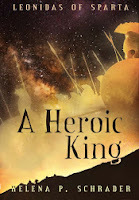
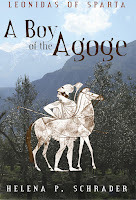
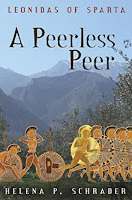
August 18, 2025
Settings that Inspire Inspiration
Inspirational Kantara!
Personally, the Island of Cyprus and most especially the above pictured castle of Kantara was the setting which had the most profound influence on my writing. An unplanned trip to Cyprus (my husband and I had booked a trip to Egypt but because of a terrorist attack had to rebook our holiday at short notice), inspired years of further research and travel culminating in six published and three unpublished novels. The most obvious of these is The Last Crusader Kingdom.
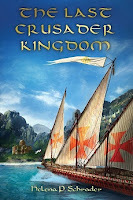
I was immediately intrigued by Richard the Lionheart's sojourn on the island, but then became fascinated by the dramatic opposition of the Cypriot barons to the tyrannical Frederick II Hohenstaufen. I wrote a series of novels about Cyprus during the civil war in the early 13th century, but doubting the appetite of the reading public for such an obscure topic I never sought a publisher.
Several years later, the release of the film "The Kingdom of Heaven" re-ignited my interest in this period of history. Suspecting Hollywood might not have gotten all the facts right, I started to research Balian d'Ibelin and discovered that the historical Balian was considerably more interesting than the Hollywood Balian. I became inspired to write my Jerusalem Trilogy, set in the Holy Land during the end of the twelfth century. Yet having come to the end of Balian's known life I was confronted by an alluring mystery. How was it possible that the ever incompetent Guy de Lusignan had managed to pacify an island the Knights Templar had given up on? How had the disastrous King of Jerusalem become the wise and successful ruler of Cyprus.
The mystery took me back to Cyprus and indeed a new and exciting hypothesis, which is the basis of The Last Crusader Kingdom. Not only that, but the story of Balian's eldest son, the historically more famous John d'Ibelin, Lord of Beirut, had its roots in Cyprus too. And so I returned -- to Kantara again and again.
Find out more about the novels set in Cyprus at: https://helenapschrader.net/crusades-era/
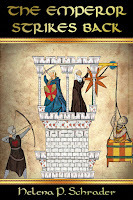
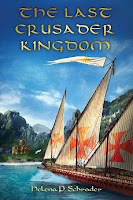
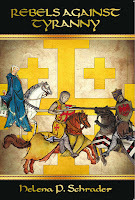
August 11, 2025
Settings aren't just Background
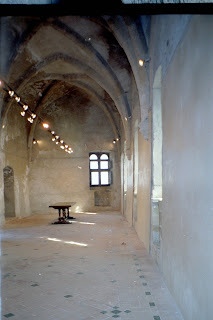
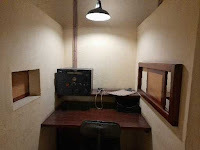
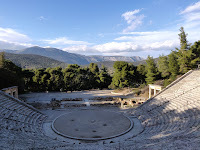
The settings of historical fiction novels don't just create atmosphere, and they also create 'facts.' In a book set in ancient Rome no one can travel by plane or place a telephone call. In short, the 'setting' determines the options the characters have for movement and communication. The setting establishes parameters for climate, the type of clothing worn, languages spoken, prevailing religious beliefs, social customs, the status of women and so on. While that is true in contemporary fiction too, it is not necessary to explain a setting that is familiar to the reader.
By contrast, in the historical fiction, setting is so important that it is the single most important factor used for classifying books within the genre. Historical fiction books are categorized first and foremost by the time period in which they are set and then the geographic region. We speak of "a novel set in the American civil war" or "a novel of Ancient Rome" or perhaps "a novel set against the tumultuous backdrop of the War of the Roses." In all cases, the setting of the novel defines it before we dig deeper to discover if this is a romance, a war-story, or a mystery.
The other way in which settings are particularly important to historical fiction is that for most readers the setting will be unfamiliar. In a novel set in contemporary times, an author can say: " He stopped at MacDonald's for a Big Mac, and then ...." No further explanation is needed. For a novel set in Ancient Egypt, the author is going to have to describe what a quick snack looked like and where it could be obtained -- or maybe do without that little episode altogether in order not to bore the reader.... A novel set in modern times can say: "He worked in a open-space office with tiny cubicles" and the reader already sees the environment. Most readers, however, cannot immediately picture the scene if the novelist says: "He worked in the Scriptorium of the abbey."
Given the importance of settings to the genre, it hardly surprising that historical novelists are particularly influenced by settings before they even set out to write. Settings can inspire, inform and enrich an author -- enabling them to share that experience with the readers. I will be discussing each of these functions in the weeks ahead.
My novels are set in three distinct historical eras: Ancient Sparta, the era of the Crusades and the mid-20th Century, Find out more at: https://helenapschrader.net
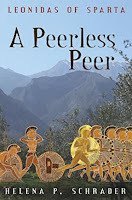
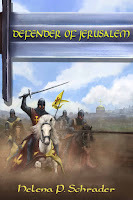
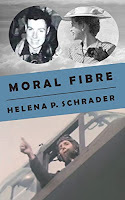
August 4, 2025
Characters in "Cold Victory" : Georgina's Girls
I want to end the introductions to the characters in "Cold Victory" with this collective introduction to "Georgina's Girls." Georgina Moran, familiar to many of my readers from "Moral Fibre," has come to Berlin to teach at the British School. In addition to her official duties, she organizes a joint British-German school choir and then offers sewing classes to girls who want to learn. The American nurse Anna volunteers to give the girls a medical check-up because many have had no access to medical care in years.
The girls represent the tens of thousands of teenage girls in Berlin at this time.
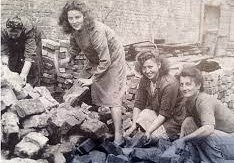 In this excerpt, an inadvertent remark triggers an explosion of confessions that lay bare the burden these girls carry within them.
In this excerpt, an inadvertent remark triggers an explosion of confessions that lay bare the burden these girls carry within them.“But what if you didn’t have achoice?” Petra asked in a strained voice that made Georgina look over at her inconcern. Petra rarely spoke up. Usually, she just trailed unhappily inDietlinde, Gisela and Ulrike’s wake.
“A choice about what?” Anna asked,having lost the thread of the conversation.
“About having sex,” Petra burstout, her face flushing.
A hush fell over the whole roomand Georgina’s instinct was to change the subject, but Anna confronted thequestion head-on. “Especially when you didn’t have a choice, Petra. Aman can force you to have sex with him, but he can’t force you not to go toschool, or not to get job training, or not to work.”
“The f**king bastards don’t carewhat our names are, much less give a f**king damn what we do with our livesafter they’ve got what they paid for!” Gisela erupted with an explosion ofunexpected fury, adding bitterly, “It’s the rest of society that won’tgive us a chance!”
Dietlinde said something to her inGerman which triggered an even more violent reaction. With a sharp push, Giselathrust Dietlinde away and screamed at her in German.
Ulrike and Hannah tried tointervene, but that only made things worse. Gisela shouted and screamed inGerman, eliciting equally vociferous answers from Ulrike, Dietlinde and Hannah.Like a mini cyclone, emotions spiralled out of control.
After recovering from their shock,Georgina and Anna tried to intervene, but Gisela swung on them, shouting inEnglish, “My father wanted me to shoot myself! He gave me his pistol —butt-first. He didn’t even give me time to pull up my panties! I was tremblingand bleeding and I wanted to be sick, and he just jabbed a pistol butt in myface!”
Georgina stopped breathing andAnna froze.
Gisela continued, “My mothershoved him aside and bundled me out of the house — but he shouted after me notto come back. He said I was dead to him — whether I had the ‘decency’ to killmyself or not!” She turned and focused on Anna, who had had the temerity tosuggest she had control over her fate. “I live with my aunt now, but she hasthree children and no job. She’ d have nothing if I didn’t earn enough cigarettesand chocolate for her to trade on the black market. At least she’s thankful forit.”
Like puss pouring from a puncturedboil, the other stories followed.
“My mother says I don’t belong inschool,” Ulrike announced, her teeth clamped. “She says I’d earn more moneyworking all week rather than just on the weekends. But why should I put out forfour or five GIs every day so she can buy herself gin? She steals half thenylons they give me anyway, and the cigarettes, of course. But she’s a ‘lady,’and I’m just a whore!” She grabbed a cigarette and lit up, a grim expression onher face.
“After the Ivans had me, theconcierge cornered me and forced himself on me as well. He said since no decentman would ever marry me, I had no right to ‘put on airs’ and ‘pretend to be anice girl,’” Beate lashed out.
“German men are the worst bastardsof all!” Hannah concurred bitterly. “First, they let the Ivans do what theyliked with us, and then they call us traitors for sleeping with ‘the enemy’!”
“They didn’t all abandonus!” Petra protested, surprising the others. “My father tried to stop theIvans. He stood up to them, but they shot him three times in the stomach. Thenthey raped me while he writhed in pain and bled to death.” Petra burst intotears as she cried out, "Maybe if I hadn’t resisted, he’d stillbe alive!”
Georgina recoiled in horror; she couldidentify with this story more than the others because she could easily imagineher father trying to protect her. The horror of his pain and death on top ofthe violence of gang rape was unfathomable. She took Petra into her arms andtried to comfort her.
But Dietlinde wasn’t finished,“All good German men were dead!” she declared. “The ones left aliveeither surrendered or ran away!”
“They surrendered to theIvans but still think they have a right to our bodies for free becausethe victors have already had them,” Ulrike spat out contemptuously, and herwords were greeted by a flurry of agreement that tapered off into silence. Petragently pulled herself out of Georgina’s arms, wiping the tears away from herface with her hands.
The short but intense outburst ofconfessions, like a violent thunderstorm, ended as suddenly as it started. Butinstead of clearing the air, Georgina felt the tension simmering. She knew thather nerves were too frayed to cope with any more revelations. She was going to needto reflect on what she’d learnt today for many hours and days to come, and she wantedher father’s advice too. She lookedtoward the clock and announced in relief, “Look at the time! We must pack awayour things and lock up.”
With exaggerated alacrity to covertheir embarrassment, the girls busied themselves putting their unfinishedsewing into the lockers at the back of the class and donning their old over-clothes.Meanwhile, Georgina rubbed out the blackboard, and Anna wrapped herself in hercape. When the last of the girls had filed out, Georgina switched off thelights and followed them down the stairs. Outside they waved goodbye “untiltomorrow,” and the girls walked in a group toward the nearest undergroundstation, while Georgina and Anna climbed into the headmaster’s car, which hehad put at Georgina’s disposal.
After a few moments of silence,Georgina remarked, “Well, that was educational.”
“And sobering,” Anna agreed. Shepaused before adding, “There’s something else you ought to know.” Georginawaited, warned by Anna’s tone to expect something unpleasant. “First, Silvie ismore than four months pregnant. Second, Gertrud, who was nine when the cityfell to the Reds, is the only virgin, and finally, seven of the girls have VD.”
Georgina caught her breath. Shethought back to when she had been their age, attending an Anglican boardingschool for girls. If even one of them had not been a virgin, it would have beena scandal, and she’d never heard of VD. She thought back, too, to her firstencounter with Herr Dr Altenheyn. He’d emphasised that the Kaiser WilhelmSchool was an ‘elite’ school. The parents of these pupils, he’d claimed, werebureaucrats, professionals and academics. Perhaps that was the reason they wereso incapable of coping with their daughters’ fall from grace?
She shook her head and admitted,“I heard about the Russian rapes before I came, but everyone talked about themas though they were history. It was something terrible that had happened ‘inthe war,’ rather like the bombing and the concentration camps. No one seemed tounderstand that those rapes are still warping lives. It must be the sameall across the city.”
Find out more about the Bridge to Tomorrow series, the awards it has won, and read reviews at: https://helenapschrader.net/bridge-to-tomorrow/
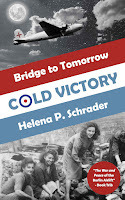
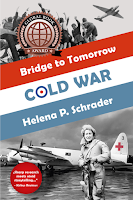
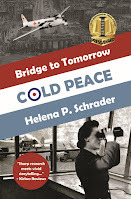
July 28, 2025
Characters of "Cold Victory" : Anna Savage
Anna is former US Army nurse recruited by the private British air ambulance company, Air Ambulance International, as a flight nurse on medical evacuation out of blockaded Berlin. Her role may be secondary, but nevertheless important.
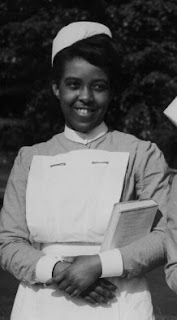
In this excerpt, we learn about her background and how she chanced upon this extraordinary opportunity. The story of her grandfather is described is based on a historical incident that took place in Georgia in May 1919.
“Aunt Flora?” Anna called out asthe screen door chinked shut behind her. “Aunt Flora? It’s me. Anna.” Thespacious kitchen with its big, wooden counters and endless cupboards stretchingalong the back of Judge Warren’s neo-classical mansion in Eastman, Georgia hadbeen the realm of Aunt Flora for as long as Anna could remember.
Aunt Flora had first brought Annahere when she was eight years old. That was about two years after her motherhad left her father because he’d beaten her once too often. Her mother had beentrying to make enough money to keep herself and her daughter in clothes andfood by working at a diner where truckers stopped. They lived in a shack outback, without electricity or running water. Then, out of the blue, Aunt Florahad arrived and there had been a terrible fight between the sisters. In theend, Aunt Flora stuffed a pathetic pile of worn-out things — all Anna owned —into a cotton sack and brought Anna to Eastman on the bus.
At the time, Anna had never beforebeen in a town with streetlights and rows of pretty houses with big greenlawns. Eastman had awed her even before Aunt Flora marched her up to the big,red brick house with towering white pillars and a chandelier hanging over theporch — much less introduced her to a white lady who smelled of flowers. Thelatter was Miss Josephine, the wife of Judge Warren, and Aunt Flora’s employer.
When Anna turned fourteen, she wasone of just three girls allowed to go to the private high school for colouredpeople. Anna’s grades were so good that Aunt Flora wanted to pay the fees outof her own pocket, but Miss Josephine wouldn’t let her and made the payments instead.Miss Josephine came to Anna’s graduation too, the only white woman in the wholeauditorium. After she graduated, Miss Josephine helped her get into nurse’straining, too.
The adult Anna was thankful butnot beholden to Miss Josephine. She’d worked hard to get those good grades, toqualify as a nurse and to serve her country.
“That you, Anna?” Aunt Floracalled, coming in from the front of the house.
“Yes! Miss Josephine sent for me.Do you know why?”
Flora gave her a look that saidshe was in big trouble. “Ah don’t know why Miss Josephine sent for youAnna Elizabeth, but Ah can sure as blazes guess! Which is why you are goin’to sit you’self down at that table and get you’ ears blistered.” Anna might be26 years old, a qualified nurse and living in her own apartment over on ElmStreet, but she respected Aunt Flora too much to talk back. She pulled out awooden chair and plopped down, but she held herself upright and looked at heraunt with an expression bordering on defiance. She was prepared to defendeverything she’d said and done.
Aunt Flora stood with her fistsplanted on her hips and she glared down at Anna. “Now what Ah heard — andlikely what Miss Josephine heard — is that you been meddlin’ in this businesswith the Basey girl, saying she shouldn’t have to carry her baby to term—”
“Aunt Flora! Rosie Basey’s a child.She’s just twelve and she’s all skin and bones! She’s not strong enoughto carry a baby to term — much less the child of that fat, white—”
“Don’t you dare say that bad wordin mah kitchen!” Aunt Flora stopped her.
“If somebody doesn’t do somethingsoon, she’s going to die!” Anna protested furiously.
“Yes and everyone from here toSavannah knows you think that! Which means that if some mornin’ that childturns up without a baby in her belly, you goin’ to be in such hot water, thereain’t nothin’ Judge Warren can do to save you!”
“Abortion isn’t illegal if it’snecessary to save the life of the mother,” Anna countered. “I’ve been readingup—”
“Don’t go talkin’ legalgobbledegook with me, Anna Elizabeth. This don’t have nothin’ to do with thelaw. No one goin’ to give you a chance to defend you’self in some court where somefine lawyer paid for by the NAACP might point his finger at Cabe Lawson anddemand he stand trial for rape—”
“Which is exactly what he shoulddo!” Anna interrupted. “Why don’t people see that and demand it? A helplesstwelve-year-old girl was raped by a white —” She bit her tongue, looking for aword she was allowed to use, “— ape, and nobody in this county has the guts tostand up and say so, much less help her!”
“Cabe Lawson’s got a rich daddyand people don’t want a lot of Yankee newspapermen comin’ down here to make funof them and call them names. Before they let that happen, they will string youup on the nearest tree and use you for target practice like they did you’great-granddaddy.”
Anna was blindsided. She’d comehere expecting a lecture about being too outspoken. She’d expected MissJosephine to gently advise her to keep a lower profile and for Aunt Flora toamplify the message more forcefully. She had not anticipated talk of lynching —and no one had ever told her that her great-grandfather had ended that way. “Great-GranddadWashington was lynched?” Anna asked in a dazed voice.
Aunt Flora nodded, and suddenlythe rage that had burned in her was doused as if by a gust of rain. Aunt Floraseemed to shrink before Anna’s eyes, her anger replaced with something closerto despair and pain. A chill gripped Anna. “Why?” she whispered, alreadysensing how terrible the truth might be. “Why did they lynch him?”
Aunt Flora sank into the nearestkitchen chair and without looking at Anna she answered in a wooden tone, “Theylynched him because he beat to a bloody pulp the boy who done raped me and shotthe white boy goin’ after you’ mother.”
That was almost too much to takein. Anna stared at her aunt, her emotions in turmoil and her thoughts careeningaround her head. After a moment, she forced herself to focus on one fact. “Youwere raped by a white boy?” Flora nodded slowly. “And my mother?”
“You’ mother crawled out thewindow and ran into the woods screaming. Granddad heard her, saw a man chasin’after her and shot him. Then he rushed into our bedroom and found me crushed onthe bed hardly able to breathe, let alone cry for help —” she cut herself offand sat for several seconds with her eyes closed. Then she shook her headsharply as if to clear it of memories, and continued in a more matter-of-facttone, “Granddad didn’t dare shoot in case he hit me, so he used his fistsinstead. When that boy couldn’t fight back no mo’, granddad kicked him outsideand got me to the hospital. They wanted to keep me overnight, so he went home.”She stopped again to gather her strength and drew a deep breath beforeconcluding, “The KKK was waitin’ for him. They overwhelmed him, strung him up,and shot him fifteen times.”
They stared at one another. Annahad a thousand questions. She drew a breath.
“Befo’ you ask,” Flora stopped her.“Yes, Ah did get pregnant, and that’s why Ah had to drop out of school.But Miss Josephine insisted on me comin’ and livin’ here, and Ah’ve had a homehere ever since… and if you dare to lay you’ hands on an unborn infant—”
“Now Flora, there’s no need to usethat tone of voice with our Anna,” Miss Josephine swept into the kitchen.Despite her 72 years, she was still elegant, but she was frail too. Annaguessed she weighed no more than 100 pounds, and her pale skin was marred byage marks that no amount of make-up could cover. Yet she was resolute and firmas she declared, “All Anna has been saying is that a mother’s life is asimportant as a baby’s and that a doctor ought to look into the matter. She’squite right.”
As she spoke she crossed thekitchen to give Anna a hug and then gestured for her to sit down again, takinga seat herself.
“Anna, I didn’t send for youbecause of this business with the Basey girl. You’ve done nothing wrong, andyou are quite right that something must be done to help her.” Miss Josephine’sbony hand with a large diamond ring reached out and covered Anna’s. “Trust me,Anna, the Judge and I will find a way to help. But your aunt is right, too.Some people around here don’t see straight, and they might make trouble foryou. It’s time for you to consider other options for your future.”
Anna frowned, feeling patronizedand muzzled. She wanted to protest, but she couldn’t bring herself to be rude —not knowing the full extent of Miss Josphine’s assistance to Aunt Flora. MissJosephine continued, “I know how frustrated you’ve been since you returned fromthe army.” No doubt she did, Anna thought; she hadn’t made a secret of it. “Thework here is monotonous and demoralizing and you’re earning donkey’s wages.”That summarised her life very well, Anna admitted. Her work consisted mostly offutile efforts to counter the effects of acute poverty on coloured women andchildren. Her daily bread was dealing with malnutrition, dysentery, rickets,TB, abuse, and neglect — with the occasional rape thrown in for variety, shethought bitterly.
Miss Josephine was continuing,“Now, I’m sure you remember Colonel and Mrs Howley, and you must have heardthat Colonel Howley is now the US Commandant in Berlin”
“Of course!” Anna replied. Howcould she not have heard? She was amazed and thrilled to think that a man shehad once given physical therapy to was now so important that he was often inthe papers or on the radio. His wife had encouraged her to apply to the US ArmyNursing Corps, and Anna was certain that the colonel had pulled strings to gether in.
“Well,” Miss Josephine continued,“it seems there is a terrible shortage of medical personnel in Berlin and MrsHowley sent me a cable to ask if you would be interested in working as a nurseon an air ambulance. They thought of you because you speak German from workingat that POW camp during the war.”
Anna was so astonished she couldonly stammer. “A flight nurse?” Ever since her army training near some AirCorps bases, she’d longed to fly. “With the army?”
“No, I’m afraid not. Mrs Howleysays it’s a private British company, but this is still an amazing opportunityfor you. It comes at a perfect time, too — when there are so many unkindrumours floating around. Some ignorant folks think you’ve become uppity and —wrong as they are — they could harm you.” Miss Josephine leaned closer todeliver this message. She was, Anna sensed, just as worried as Aunt Flora.
Anna nodded. She had joined theArmy Nursing Corps to get away from Georgia. She’d wanted to see more of thecountry, more of the whole world. She’d dreamed of being sent to a fieldhospital in Europe. Instead, they’d sent her to a POW camp in Arkansas. Convincedshe’d been shunted off to the POW camp because of the colour of her skin, she’dprotested. That earned her a reprimand and blotted her record so much that,even when she uncovered an escape plot among some of the prisoners, she’d beengiven no recognition or reward. Maybe the army was different now that PresidentTruman had ended segregation, but she wasn’t sure. So, working for a privatecompany might be better. She’d just never imagined there might be any other wayto get to Europe — or to fly.
How many hours had she stared upat the sky, watching those bright yellow training planes while she worked atthat camp in Arkansas?
Miss Josephine brought her back tothe present. “This is a once-in-a-lifetime opportunity, Anna. I hope you’llhave the courage to seize it.”
Anna opened her mouth to agree butstopped herself and looked towards Aunt Flora. The older woman had tears in hereyes, but her voice was firm. “Go, Anna. Go and see the world — not just foryou but for me and your mother and all of us stuck here in Dodge County!”
Find out more about the Bridge to Tomorrow series, the awards it has won, and read reviews at: https://helenapschrader.net/bridge-to-tomorrow/



July 21, 2025
Characters of "Cold Victory" : Jasha
Jasha is another character who reminds us of the unspeakable horrors the women of Eastern Europe endured at the hands of two dictators. Her husband and son were murdered by Stalin. She was enslaved by Hitler, and then raped by Soviet soldiers. Yet she is not broken and has found a rare soulmate in an aging British Lt. Colonel of Engineers.
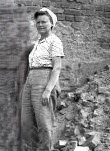 In this excerpt, Jasha prepares for her wedding and reflects on her life.
In this excerpt, Jasha prepares for her wedding and reflects on her life. Jasha looked atherself in the mirror critically. She did not look like a bride. She wore asleek, three-quarter length gown with matching jacket and hat that while elegantand sophisticated was not bridal. For her first wedding, she’d worn atraditional gown with puffy, white sleeves, and elaborate embroidery on theskirt and bodice that suited her plump and rosy body. But she was not sixteen anymore and years as a slave labourer had left her gaunt. Nor was she marrying in apeasant village in White Russia with aunts, uncles and cousins galore. She wasn’twearing white in the English tradition, either. How could she? She was neitherpure nor innocent. She’d chosen instead a dress in a dusty rose colour, ashes-of-rosesthey called it. That seemed appropriate for a forty-five-year-old widow attemptingto start over on the rubble of the past.
The only problemwith the dress was that she owned no shoes to go with it; she had borrowed apair of low, grey heels from Emily. Together they had stuffed handkerchiefs intothe toes so she could walk in them without falling out. Hopefully, she reflected,she wasn’t trying to step into shoes too large for her on an abstract as wellas a physical level. A quarter of a century ago, the villagers had whisperedand fretted because she was marrying the young schoolteacher Jurek. He was a“stranger” and had gone to university, whereas her parents could hardly read orwrite. The consensus among her neighbours had been that she was getting “aboveherself” and no good would come of it.
They had beenright, Jasha reflected, but not for the reasons they had imagined. Besides, therehad been almost twenty good years before calamity struck. Jurek had taken heraway from the hidebound village. He’d found jobs in larger towns and biggerschools until he got his wish of living and working in Minsk. Long before theyreached Minsk, she had accepted that she would have no additional childrenafter Alojzy was born. She had started working as a cook outside the home tomake extra money. With Alojzy to dote on and worry about, it was easy to ignorethat she and Jurek spent little time together anymore. The passion between themhad definitely cooled, she admitted, and yet, there was nothing fundamentallywrong between them. If — She slammed a door on her thoughts.
Today she wasmarrying Graham and starting a new life. She was not going to let the ghostsinterfere. She was not going to think about what she had lost. She was notgoing to ask herself whether Jurek or Alojzy would have approved. Nor did shewant to think about what happened to her after Stalin murdered her husband andson. She had survived what she called ‘the years of terror’ but at a terriblecost. Yet, as she slipped her rosary into her handbag, she could not forgetthat a neighbour in Minsk had been sentenced to ten years in the Gulag just forowning one. The scars were there. They always would be. She was simplydetermined not to let them cripple her.
Emily Priestmancalled up the stairs, “Are you ready, Jasha? The car is out the front.”
“Yes, I’mcoming.” Jasha picked up the littlewicker suitcase with her change of clothes and toiletries. Graham had bookedthem a room at the Hotel Olympia. She found she was both nervous and excited bythe thought of sleeping with him. It was odd how the act of telling Grahamabout the rapes had freed her of their spell. They had been pushed into thatplace in in her brain alongside Jurek and Alojzy’s murders and her years as aslave, behind that mental door that she kept locked and barred.
She took thestairs slowly, afraid of falling out of her loose shoes, and found Emilywaiting impatiently in the front hall. Yet when Jasha reached the last step, Emilybroke into a smile and exclaimed, “You look lovely!”
“Yes?” Jashaasked back uncertainly. “I do not want to shame Graham. He is British officer. Ido not want to look like peasant or servant.”
“You look likeneither, Jasha,” Emily assured her, meeting her eyes. Then turning around, shepulled a large bouquet of pink roses from the table behind her. “Graham sentyou these,” Emily told her as she handed them over, adding with a wink, “I didtell him the colour of your dress.”
They were so bigand full that Jasha gasped in wonder. Where had he found roses like these inblockaded Berlin? They could only have come from some royal greenhouse in theWest, she thought. Jasha felt tears in her eyes as she buried her nose in theblooms, breathing in their rich scent. Gardening was what had brought themtogether. Surprising her with a bouquet like this was the perfect gesture.
Find out more about the Bridge to Tomorrow series, the awards it has won, and read reviews at: https://helenapschrader.net/bridge-to-tomorrow/



July 14, 2025
Characters of "Cold Victory" : J.B. Baronowsky, one of the Candy Bombers
J.B. Baronowsky is a former B-17 pilot who flew on the Airlift throughout the fall of 1948. He became involved in the candy drops to Berlin's children, but he has been yanked off the Airlift by his fiance's father. His soon-to-be father-in-law is a senior VP at General Motors, who could lean on his Congressman.
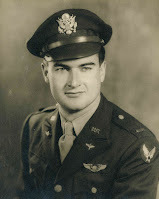
In this excerpt, J.B. listens to the news from Berlin and it triggers an unexpected conversation with his Dad with serious consequences.
J.B. Baronowskystood in the living room of his parents’ small, single-level house inYpsilanti, Michigan straining to hear the news crackling over the airwaves. Theman speaking was Colonel Howley, the American commandant in Berlin. J.B. knewhis voice well because he’d heard it a hundred times over the Armed ForcesNetwork when he was flying the Airlift. Now, although the static made Howleysound like he was a world away, his elation and triumph had survived the tripacross the Atlantic. “…a vote for Freedom! Mayor Reuter’s party has improvedits hold on power by almost 16%. The SPD won an absolute majority with 64.5% ofall votes cast.”
The reporterasked a question that was garbled by static, but Howley answered clearly. “TheSPD is a democratic party, firmly committed to fighting Soviet tyranny andaggression. This is the party, remember, that voted unanimously againstHitler in 1933. Mayor Reuter is a courageous leader, and I look forward toworking with him more closely than ever in the days and weeks ahead.”
Again, thereporter’s question was unintelligible, but J.B. hung on Howley’s words,“Absolutely, the Airlift will continue! The people of Berlin have made it 100%clear they do not want to be swallowed by the Russian bear. They don’t want tobecome slaves of Stalin. They’re willing to go without heat in their houses andlive with just two hours of electricity a day and to walk to work and eatpowdered potatoes, powdered milk and powdered eggs for as long as it takes tomake Stalin loosen his hold. Let me tell you, it isn’t easy to live in the coldand the dark on half the food we Americans are used to, but the Berlinersprefer that to being prisoners of a system that denies them the right to thinkfor themselves. We could learn a thing or two from these hardy Berliners!”
The reporterthanked the colonel and the station cut off the connection with Berlin to turnto the sports news. J.B. reached up to switch off the radio altogether.
“What are youdoing here, J.B.?” His father’s voice caught him by surprise. “I thought youwere out with Patty all day?”
J.B. turned toface his father with a guilty shrug and a sheepish grin. “Yeah, I know, I mean— I don’t know. I wanted to hear what had happened in Berlin, and Patty and herfolks don’t care. Besides, I needed to get away from them all for a bit.” Heshrugged again uncomfortably and then admitted, “I made up an excuse about yourcar breaking down and how I had to take you and Mom over to grandma’s.”
His father noddedslowly, his expression unreadable, but his eyes were fixed hard on his son. J.B.avoided them, turning away to pick up the jacket he’d carelessly tossed on thesofa when he came in. He pulled the sleeves straight and folded it over hisarm.
The elderBaronowsky watched him for a moment and then said in a low voice, “Look, Jay, Iknow you’re grown up and you don’t have to talk to me about anything. That’sfine. I don’t want to start running your life. But you ain’t been acting like aman who’s about to marry the girl of his dreams.”
“Dad—”
“Wait!” The olderBaronowky held up his hand. “Hear me out, son. It’s true that your mom and Inever really warmed to Patty, but before you went over to Germany, we agreedthat she made you happy. You were pretty hot for her and glowed with pride whenshe was beside you. Since you came back from Germany, I don’t sense that sameexcitement or passion any more. I don’t see much swagger in having such aswanky girl almost in the sack, either. Did something change while you were inGermany?”
“I didn’t have anaffair, if that’s what you’re asking!” J.B. snapped back defensively.
“Hadn’t eventhought of that. I just asked if anything had changed.”
J.B. couldn’tmeet his father’s penetrating eyes. He looked down and then sank onto thesagging sofa. His eyes were fixed on the old coffee table. Stains of countlesscold drinks that had perspired into the wood marred the surface, yet all he sawwas Kathleen coming out of the fog towards him. For his father, he shook hishead and said slowly, “Nothing specific, Dad.”
His father wentaround to the other side of the coffee table and sat down. “Want to talk aboutit?”
J.B. drew a deepbreath. It would have been easy to brush the old man off, to say it wasn’t anyof his business or it wasn’t important. But it was. He’d hoped that being backwith Patty again would make him forget Berlin and Kathleen. Instead, the more hewas with Patty, the more he missed what he’d left behind. He tried to put hisfeelings into words his father would understand. “We were doing something goodover there, Dad. I was glad to be part of it. Somehow, choosing drapes for ourapartment and selecting the music for the band at the wedding just doesn’t seemvery important.”
“No, but if youloved Patty, you’d still find it all kinda cute,” his father suggested.
“Are you saying Idon’t love Patty?” J.B. gasped out.
“Do you?”
J.B. dropped hishead in his hands and scratched at his scalp with his fingernails. Withoutlooking up, he muttered, “All she seems to care about is how things look.It’s all about appearances. Does this match that? What’s the latestfashion? What colour is in vogue now? What will the neighbours think of this orthat? And the bigger the price tag, the better it is. Is that right, Dad? Islife just about money and fashion and prestige?” He looked up to meet hisfather’s eyes.
The elderBaronowsky didn’t answer. Instead, he stood, went over to the sideboard, andpulled out a bottle of vodka and two glasses. He filled the glasses, broughtthem back to the sofa and nudged his son with one hand.
J.B. took theoffered glass but didn’t drink. Instead, he put it on the table and tried toexplain, “I’ve tried to tell her about Berlin — the conditions people live in,the way the kids went wild when we dropped the candy, the presents they andtheir mothers gave us — handmade things like knitted socks or old books andlace napkins, anything that had survived the bombing. They didn’t have enoughto eat, but they kept trying to give us presents!” Although he soundedexasperated, what he wanted was for other people to feel the same amazement andincomprehension that he did. Instead, most people just said somethingmeaningless like: “That was nice of them.” Patty, on the other hand, hadresponded with, “I hope you didn’t keep any of that junk! We don’t want toclutter up our beautiful house with dirty, old stuff.”
His dad’sresponse took him by surprise. “The Poles would have treated you the same way.In Europe, you never take anything without giving a gift in return. If someoneinvites you to dinner, you bring them flowers or wine. If someone gives you abirthday present, you offer them coffee and cake. Because you are bringing thesupplies in, the Berliners want to give you something back. Otherwise, theywould feel humiliated.”
“That’s it!That’s just what it is!” J.B. exclaimed. It was a relief to have the mysterysolved and he wondered why he hadn’t talked to his dad about this earlier. “Ithink the biggest thing I learned is that they weren’t all Nazis. … Most of theGermans — just like most Americans — didn’t care much about politics until itwas too late. … It’s because of what theNazis did that the Berliners don’t want to bow to Stalin. They know what adictatorship is, and they’ve had enough. Helping them is the right thing to do.That’s why I’d rather be flying the Airlift than designing trucks for GM.”
His father noddedand asked the question J.B. dreaded, “And Patty? Where does Patty fit into allthis?”
“I don’t know! Shecertainly doesn’t want to hear about Germany or Berlin or what I did there. Shedoesn’t care about any of it.” J.B. took a deep breath and admitted,“Sometimes, I get the feeling that she doesn’t care all that much about me,either. I’m just part of the furniture. I have the right looks to fit into herliving room — yeah, maybe her bedroom too — but is that all I am? A body to putinto her perfect home and bring home the bucks so she can live in style?”
“Don’t marry her,Jay.”
Despite hiscomplaining, the answer shook J.B. “Hey, Dad! That’s pretty stiff medicine!She’s made wedding plans — a second time now! Her family has spent a fortune ona wedding gown, shoes, flowers, band, catering and all that—”
“No one askedthem to,” the senior Baronowsky reminded his son. “That was their choice.”
“Yeah, I know,but she’s been patient while I was away. If I break up with her now, she’ll goto pieces!” It was a frightening scenario.
“Listen to me,Jay,” his father interrupted his thoughts. “It’s the rest of your life you’retalking about. If you aren’t crazy about her now, you ain’t gonna be crazyabout her after she’s gained forty pounds and is spending your money like itwas water.”
True, J.B.thought, but if he broke things off he’d trigger a tempest of recriminations.
His father hadn’tfinished, “I know divorce is becoming fashionable in some circles, but theChurch does not recognise it. In the eyes of God, once you give your vows toPatty and take her to your bed, you are bound to her and her alone — forsakingall others — until death takes one or the other of you. You may sin. A lot ofmen do. But you will never be free of her to find a woman who could make youhappy. She will make you miserable, Jay — your whole life long.”
J.B. dropped hishead in his hands again. Then he noticed the untouched vodka, picked up theglass and threw the alcohol down his gullet with one toss. Shaking his head, headdressed his dad, “If I break off with Patty, that snazzy job at GM goes up insmoke, too.”
“I thought youjust told me you’d rather be flying the airlift than designing trucks?”
J.B. opened andclosed his mouth, swallowed, and then pushed the shot glass across the table,“Can I have some more of that?”
His father gotup, poured them both another shot of vodka and handed J.B. his glass. Stillstanding, he reminded his sitting son, “You never wanted that job, Jay. Youwanted the job at the Michigan Aeronautical Research Centre.”
“Yeah, but thatjob’s long gone, Dad. They gave it to their next best candidate as soon as Iturned them down.”
“So, you can goback on active duty with the USAF. I know!” His dad held up both hands as if insurrender. “They pay peanuts! Still, you could volunteer to go back on theAirlift.”
J.B. looked downat the table. Kathleen was coming at him out of the fog, and in the background,the kids were waving wildly in happiness.
“That’s what youwant, isn’t it?” his father drummed the message home.
“Yeah,” J.B.admitted, looking up at him.
“Then don’t letsomething as inconsequential as a dumb blonde and her temper tantrum get inyour way. You’ve got more important things to do with your life, Jay.”
Find out more about the Bridge to Tomorrow series, the awards it has won, and read reviews at: https://helenapschrader.net/bridge-to-tomorrow/



July 6, 2025
Characters of "Cold Victory" : Alexandra "Alix" von Feldburg
Alexandra "Alix" Baroness von Feldburg is the daughter of a German diplomat and the widow of a leading member of the German Resistance to Hitler. Readers of my novel about the German Resistance, Traitors for the Sake of Humanity, will recognize her. She returns in "Cold Victory" in her capacity as a lawyer, who has made her reputation assisting the prosecution at Nuremberg.
In this excerpt, she arrives in Berlin for the first time since the war and is confronted with her memories.
Alix had lived through BomberHarris’ ‘Battle of Berlin’ — on the ground. For the second half of 1944, whenshe was on the run from the Gestapo after the failed coup attempt of 20 July,she had spent much of her time hiding in closets and behind false walls,cowering in cupboards and lying under beds sometimes for hours. She was wantedfor treason and had been given refuge by courageous men and women who allowedher to hide in their apartments, sometimes for only a few days, sometimes for acouple of weeks. Yet she had to keep moving, and without being registered atany residence, she could not appear in the air raid shelter without arousingsuspicion. Staying above ground during air raids, on the other hand, became sodangerous that she decided to leave Berlin. She went first to a pig farm nearDessau, where she had disguised herself as a slave labourer for almost fourmonths. From there, she made her way to Braunschweig where she had been able toturn herself over to American troops in the closing days of the war.
Her last memories of Berlin wereof a city in flames. She had intentionally planned her escape from the cityduring an air raid because the raid disrupted normal traffic patterns anddistracted the attention of the authorities. She had hidden herself aboard asupply train bound for the Western Front. The Allies targeted railheads, andthe Reichsbahn did not want their precious cargo of munitions to befound by the RAF bombers. So, the train had crawled out of the city at a paceintended to be too slow for detection from the air. That had enabled her toclimb aboard unseen — and prolonged the agony of uncertainty as the bombsrained down.
Yet for all the destruction shehad witnessed on the ground, she was not prepared for the carpet of destructionspread out before her as they flew toward the city centre. Before they hadreached the worst-hit areas, however, they banked to the right and started tofollow the Havel. David shouted above the engines that it was time for her toreturn to her seat and put her seatbelt on. Alix obeyed in a daze. She'd underestimated how traumatic a return toBerlin would be.
Now she found herself wondering ifshe could cope. She had told Christian from the start that she would not setfoot in the apartment house where she had lived with Philip and where he hadkilled himself. Christian had arranged for her to live somewhere else. But ifshe was in Berlin, didn’t she have an obligation to find out what had happenedto her parent’s home? Both her parents were dead; her mother had died of heartfailure while working in a munitions factory early in 1945, and her father hadbeen shot for desertion during the assault on Berlin. However, her sister Gretewas living with relatives in Marburg and her brother Rudi had returned fromSoviet imprisonment without his legs; he was in a rehabilitation centre nearKassel. They might want to live in the family home in the future or they mightwant to sell or rent it — if it was still standing. To find out if it hadsurvived, she would have to visit her childhood neighbourhood and face thememories….
And then there was theBendlerblock where she had worked so many long, hard and yet rewarding hours.There she had met and forged friendships with the most determined andunwavering opponents of Hitler’s criminal regime — Generaloberst Beck,General Olbricht, General von Treschow — and Philip. Someone said there was asmall memorial in the courtyard, marking where Olbricht, Stauffenberg and theothers had been executed. She felt she ought to lay a wreath or at least a roseon that spot — yet dreaded the thought of treading the cobbles where suchhonourable men had been shot without trial. How could she stand where theirblood had flowed, cooled and then been scrubbed away by some indignant andardent supporter of Hitler?
Or what if she had business withsubsidiary organs of the Allied Control Council and had to visit the buildingwhere the so-called “People’s Court” had held kangaroo trials of those involvedin the coup attempt? Where Roland Freisler and his fellow Nationalist Socialist‘judges’ and lawyers had taunted, ridiculed and condemned her beloved UncleErich and so many others because they wanted to restore the rule of law andprotect human dignity and rights?
As the tyres squealed under herfeet at landing, Alix had a moment of panic. She didn’t want to be here!
Find out more about the Bridge to Tomorrow series, the awards it has won, and read reviews at: https://helenapschrader.net/bridge-to-tomorrow/




